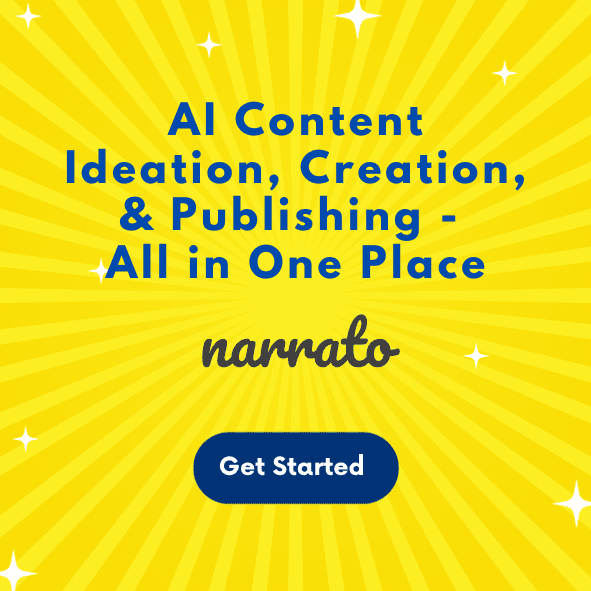The sweet spot for a good SEO meta description is when it is a combination of catchy, concise, and keyword-loaded content. But if you’ve ever written a meta description, you know how tricky it is to get it right. Good news! There is an AI SEO meta description and title generator to make this easier. AI can churn out meta descriptions that not only appeal to algorithms but also resonate with human readers. This blog dives into the ins and outs of using AI to generate compelling SEO meta descriptions, ensuring your web pages shine in search engine results. Let’s jump right into it.
Importance of SEO meta description and title
Using AI for SEO meta description and title generation
- Step 1: Navigate to the AI SEO meta description and title generator
- Step 2: Enter the page topic or title
- Step 3: Specify the main keyword
- Step 4: Tailor the content to your brand voice
- Step 5: Click generate to get SEO meta description and title
How does AI for SEO meta description and title generation in bulk work?
- Step 1. Download the sample CSV template to provide your input
- Step 2. Upload the filled-in CSV file
- Step 3. Choose the output format
- Step 4. Click ‘Bulk Generate’ to download AI-generated SEO meta description and title

Importance of SEO meta description and title
Meta descriptions and titles play a crucial role in SEO by serving as a snapshot of what the content is about. They appear in search engine results, acting as organic ad text. Good SEO meta descriptions and titles can influence the click-through rate (CTR), a key factor in improving search engine rankings. They also provide a clear overview of the web page’s content, which helps in accurate categorization of content. That’s why it’s important to analyze your webpages with a free tool like Attrock Meta Tag Analyzer to verify what search engines see and if you have pages with missing tags.
Now, let’s talk about meta description and title creation. The traditional way of creating meta descriptions involves a manual process, where SEO experts write text based on their understanding of the content and essential keywords. This method requires a deep knowledge of SEO practices, and it can sometimes be time-intensive.
An easier way around this – Narrato’s AI meta description and title generator. This AI tool uses machine learning algorithms and natural language processing to create meta titles and descriptions that are optimized for search engines. It can analyze your input and generate concise meta descriptions + titles 10x faster than manual writing. The platform comes with a bunch of other AI SEO tools to help improve your content’s rankings on search engines.
- An AI SEO content brief generator that creates a complete SEO brief to guide your content creation process, including the keywords that you should use, questions to include, and other content pieces you can use as references.
- An AI keyword generator that generates a list of topic-relevant keywords, sorted on the basis of search volume data.
- An AI Content Assistant with 100+ AI tools and templates to help in SEO writing with AI.
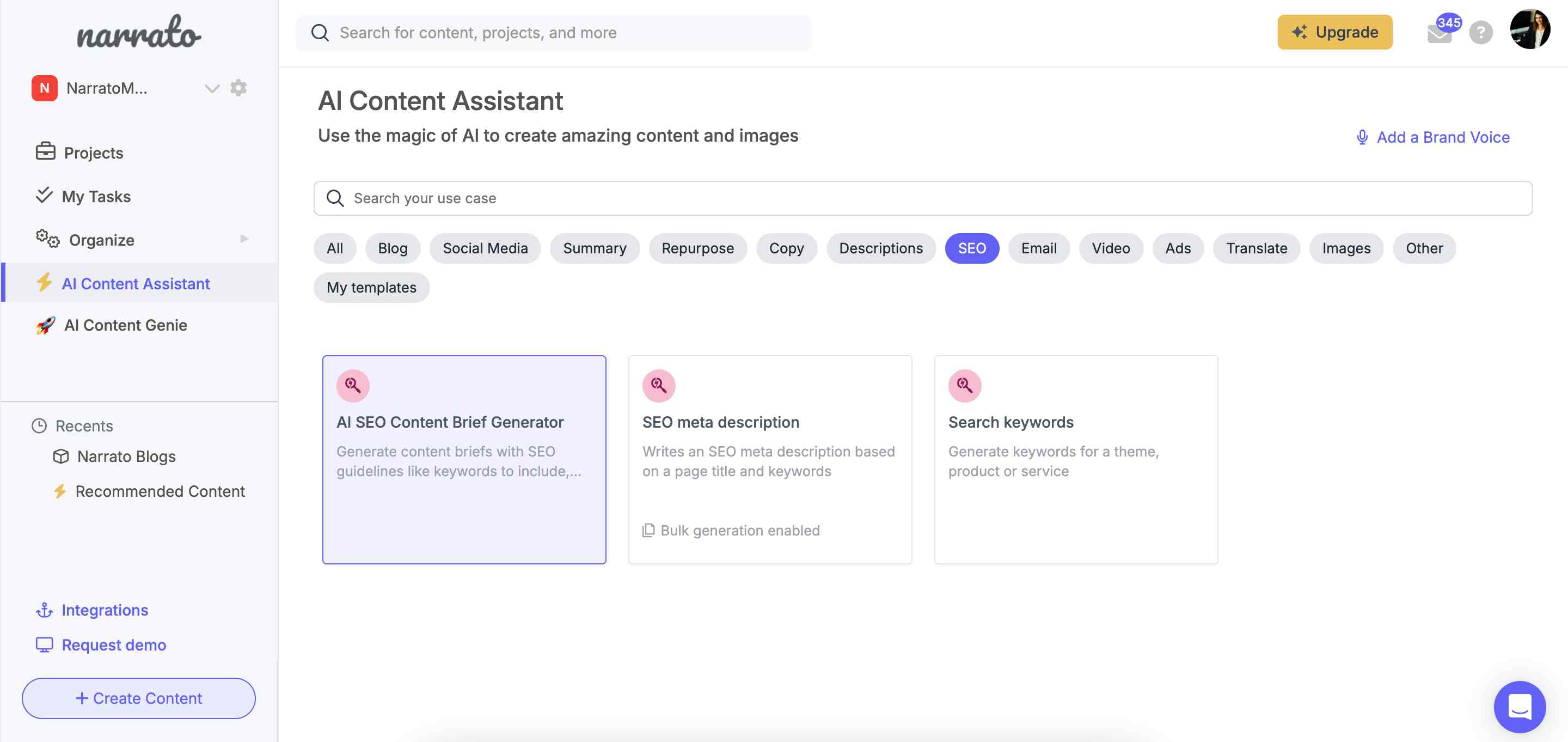
Narrato’s AI SEO tools
It’s clear that leveraging AI can significantly streamline the process, but how do you go about it? Let’s learn.
Using AI for SEO meta description and title generation
Going through this process of SEO meta description and title generation with AI involves several steps, each important to ensure the quality and relevance of your descriptions and titles.
Step 1: Navigate to the AI SEO meta description and title generator
To open the AI SEO meta description and title generator, just head over to the AI Content Assistant on Narrato Workspace, and click on the ‘SEO’ category tab. You’ll find the AI SEO meta description generator under there.
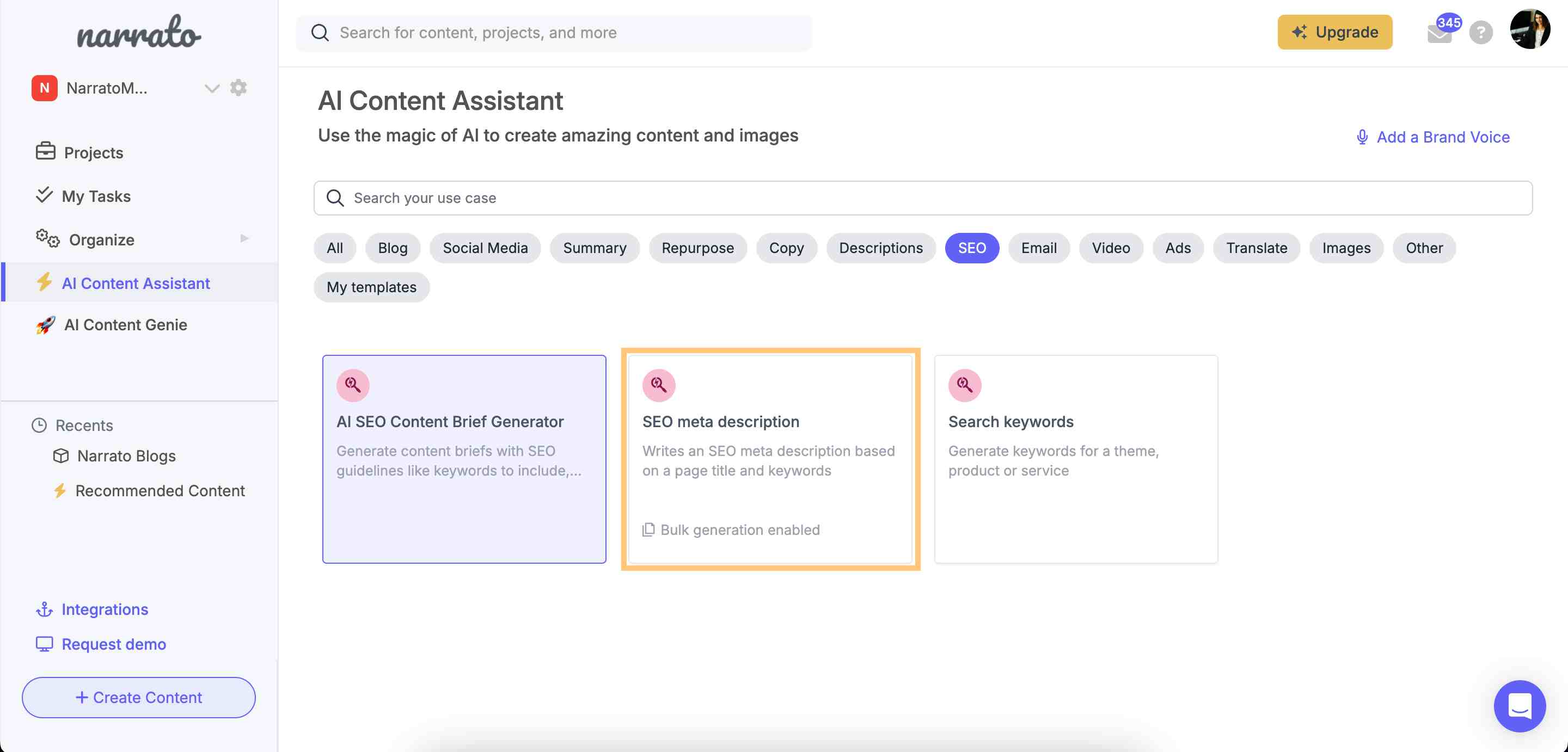
Navigating to the AI SEO meta description generator
You can also access the tool directly from the content task page, from the AI writer tab on the left.
Step 2: Enter the page topic or title
Insert the title or the main topic of your page into the generator. This should reflect the central theme of your content. It is very crucial as the AI uses this information to generate relevant meta descriptions and titles.
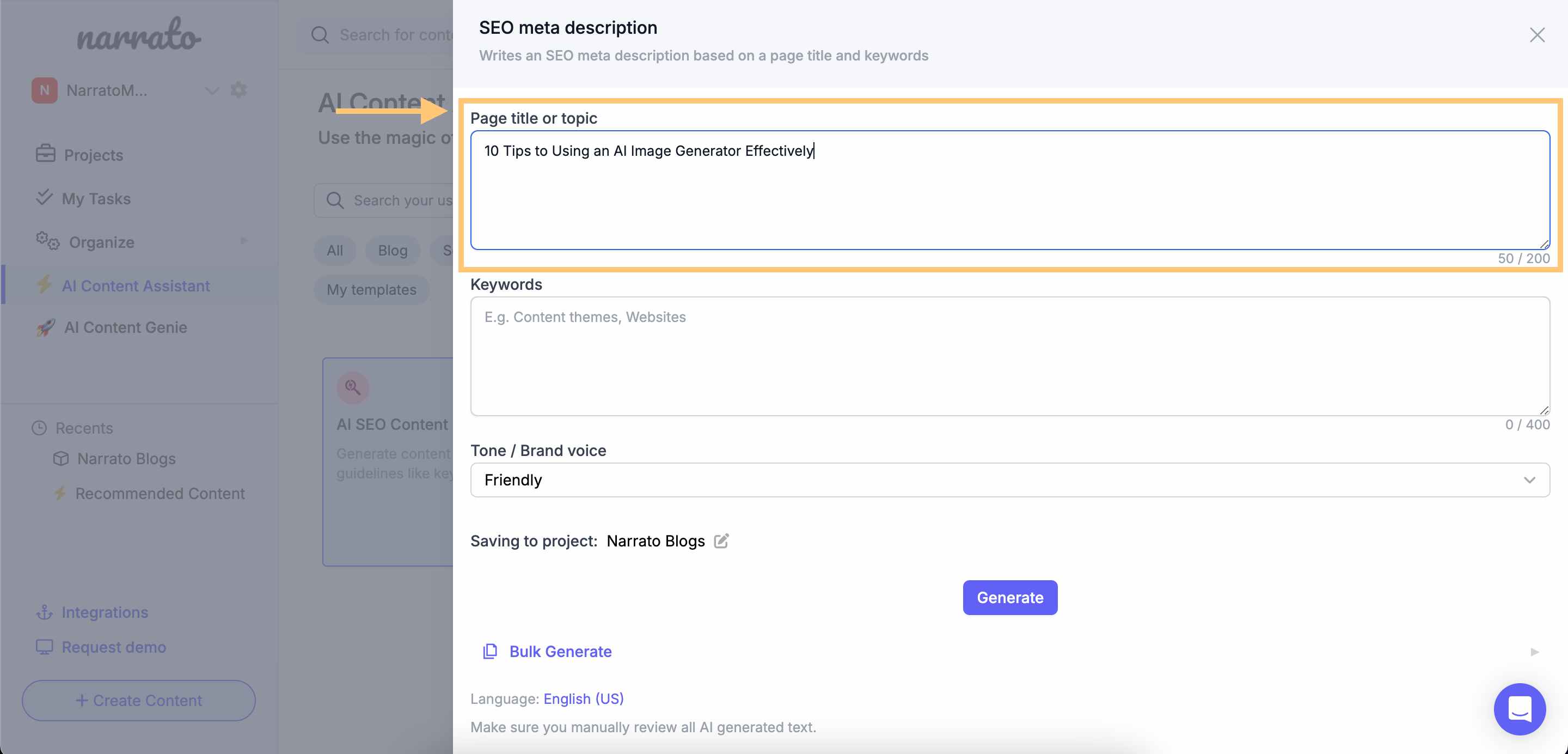
Entering the page title/topic in the AI SEO meta description generator
Make sure the title or topic is accurately phrased to capture the essence of your webpage’s content.
Step 3: Specify the main keyword
Input the primary keyword that you want to be included in the SEO meta description and title. This is a key element in the process as it guides the AI in incorporating these phrases into the meta description and title. This is how you enhance the SEO potential of the description and title – by aligning it with search queries.
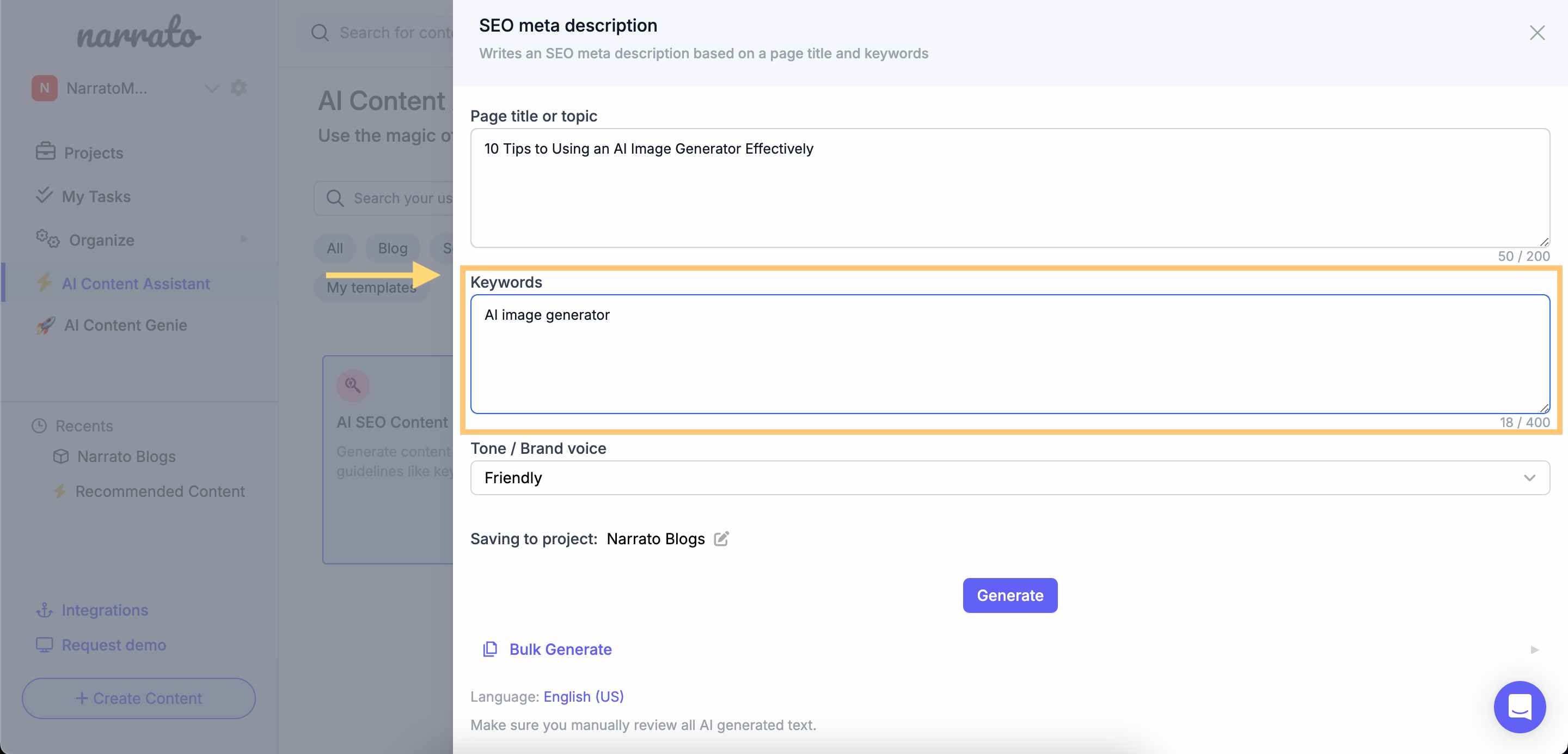
Inputting keywords in the AI SEO meta description generator
You can use Google Keyword Planner and Narrato’s AI keyword generator to find your primary keyword for the meta description. The best keyword typically is highly relevant to your content and has a substantial search volume. Implement the data from these tools for a keyword that is both significant to your business and easily searchable online.
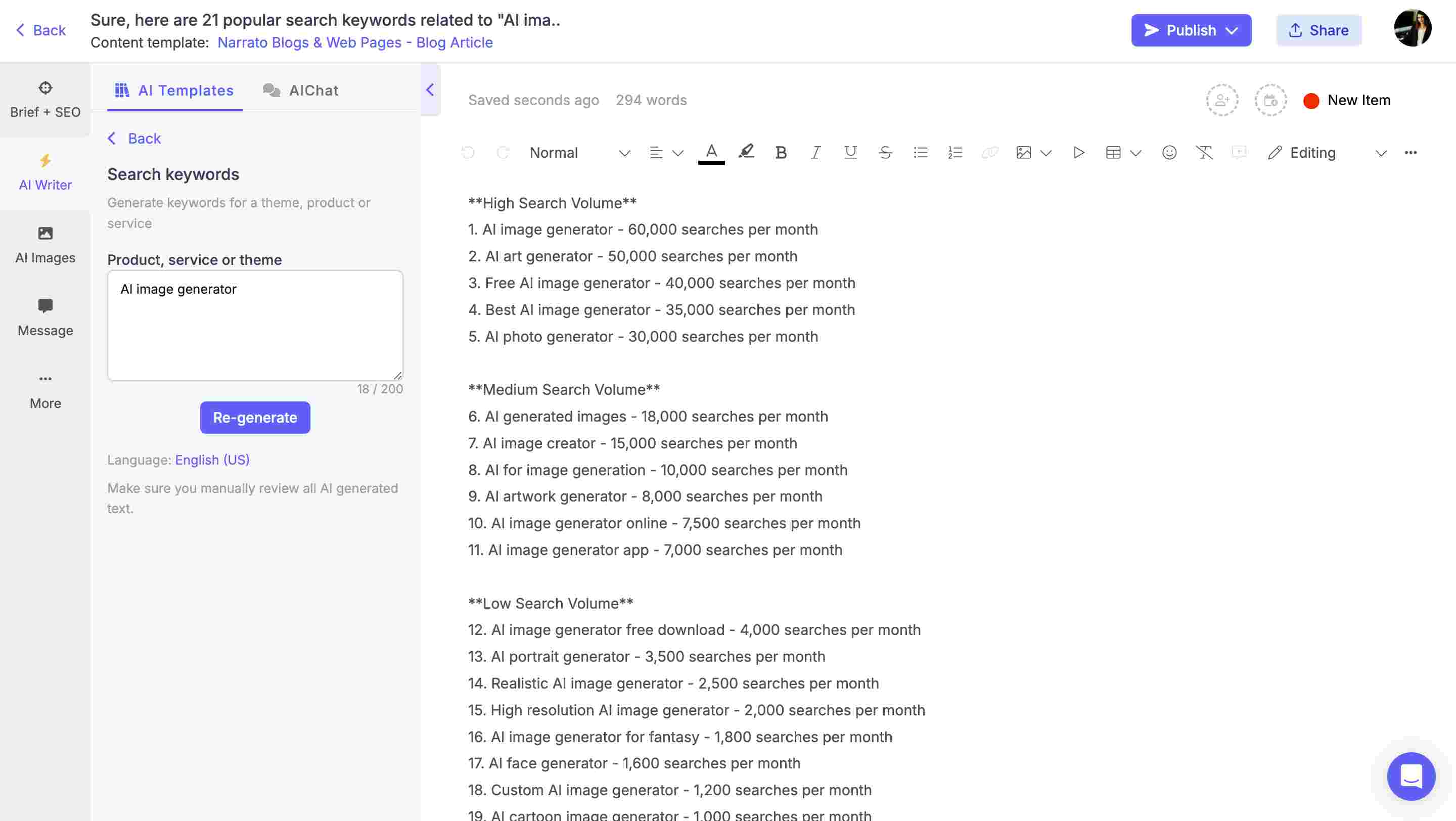
AI-generated keywords
Step 4: Tailor the content to your brand voice
With Narrato, you’ll have the flexibility to tailor the tone and style of your generated SEO meta description and title. This tool provides a variety of options for tone/brand voice, ranging from Casual, Friendly, and Convincing, to Witty and Urgent. Plus, if you’re interested in making it even more unique, you can create a custom voice using an AI brand voice generator, and then apply that when you’re generating your SEO meta description and title.
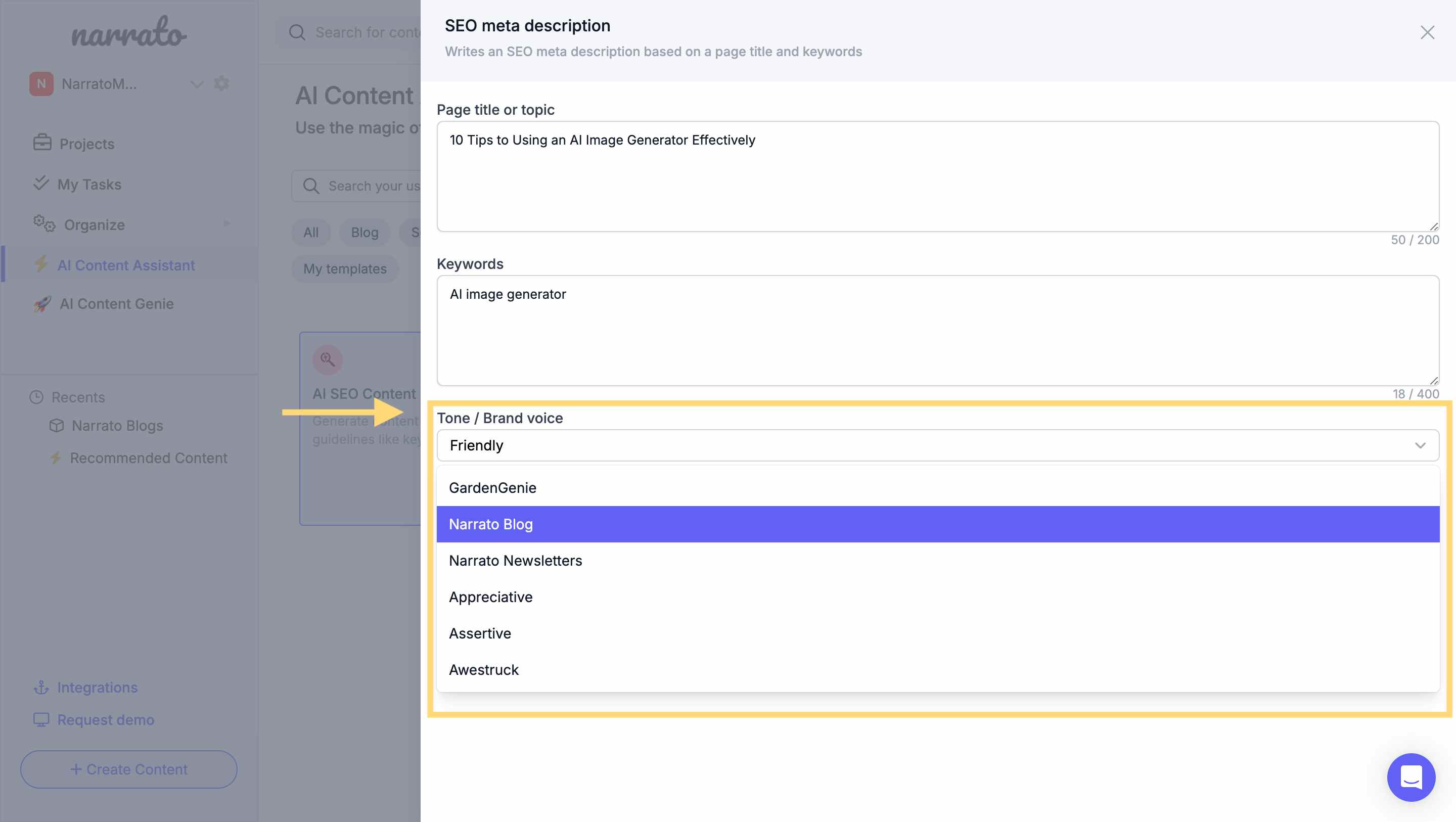
Specifying the tone for the SEO meta description and title
If the tool provides options, select the tone that best fits your brand, such as professional, friendly, or informative. This helps in keeping the personality of your brand intact even in meta descriptions and titles.
Step 5: Click generate to get SEO meta description and title
Finally, click the “Generate” button. The AI will process the information provided and within seconds to create a meta description and title optimized for SEO.
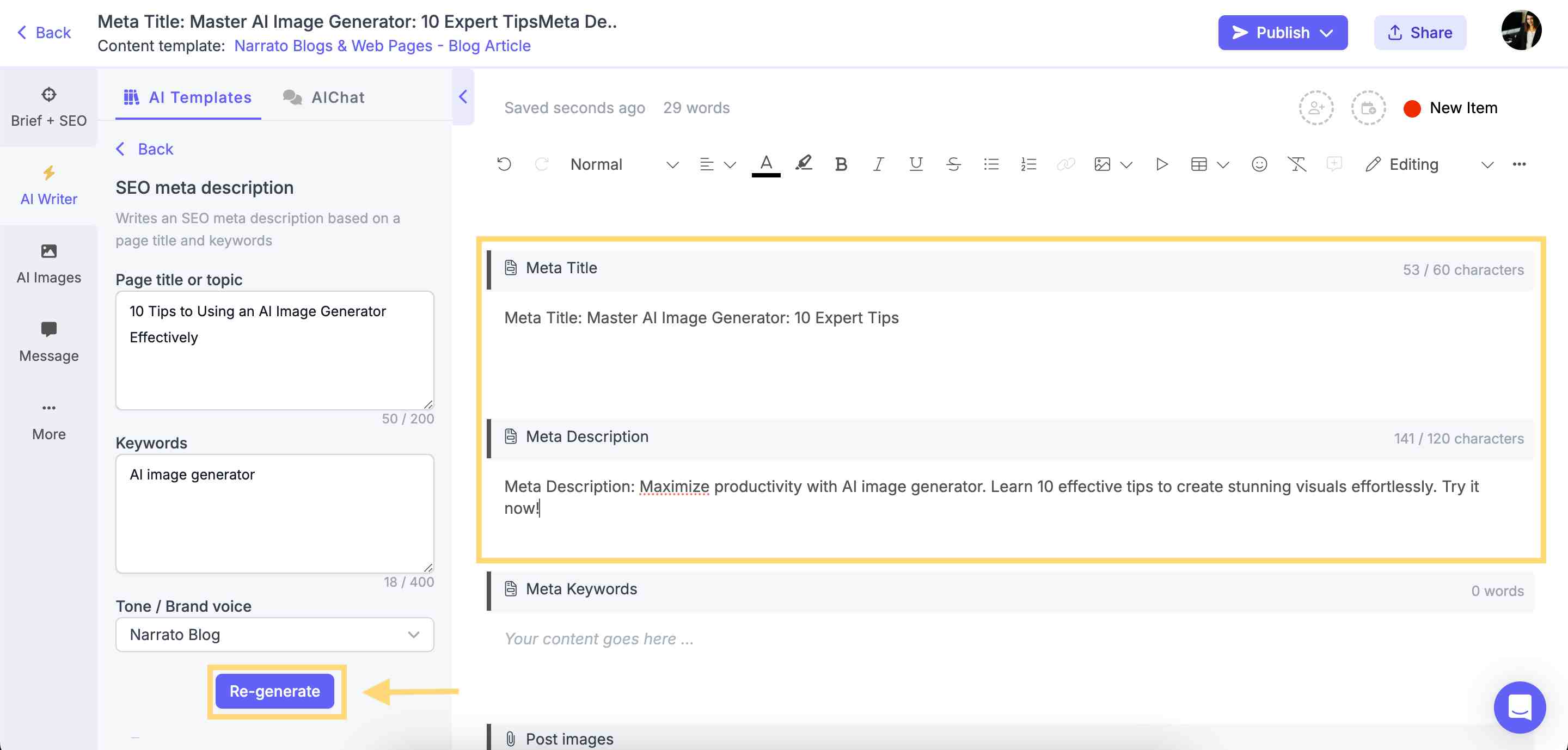
AI-generated SEO meta description and title
If you find the output to be less than satisfactory, feel free to ask the tool to re-generate.

How does AI for SEO meta description and title generation in bulk work?
Creating powerful SEO meta descriptions and titles for multiple pages can be a daunting task, but with the help of an AI bulk content generator, it becomes much more manageable. Here’s how it works –
Step 1. Download the sample CSV template to provide your input
If you open the AI SEO meta description and title generator and scroll down, you’ll find the Bulk Generate option.
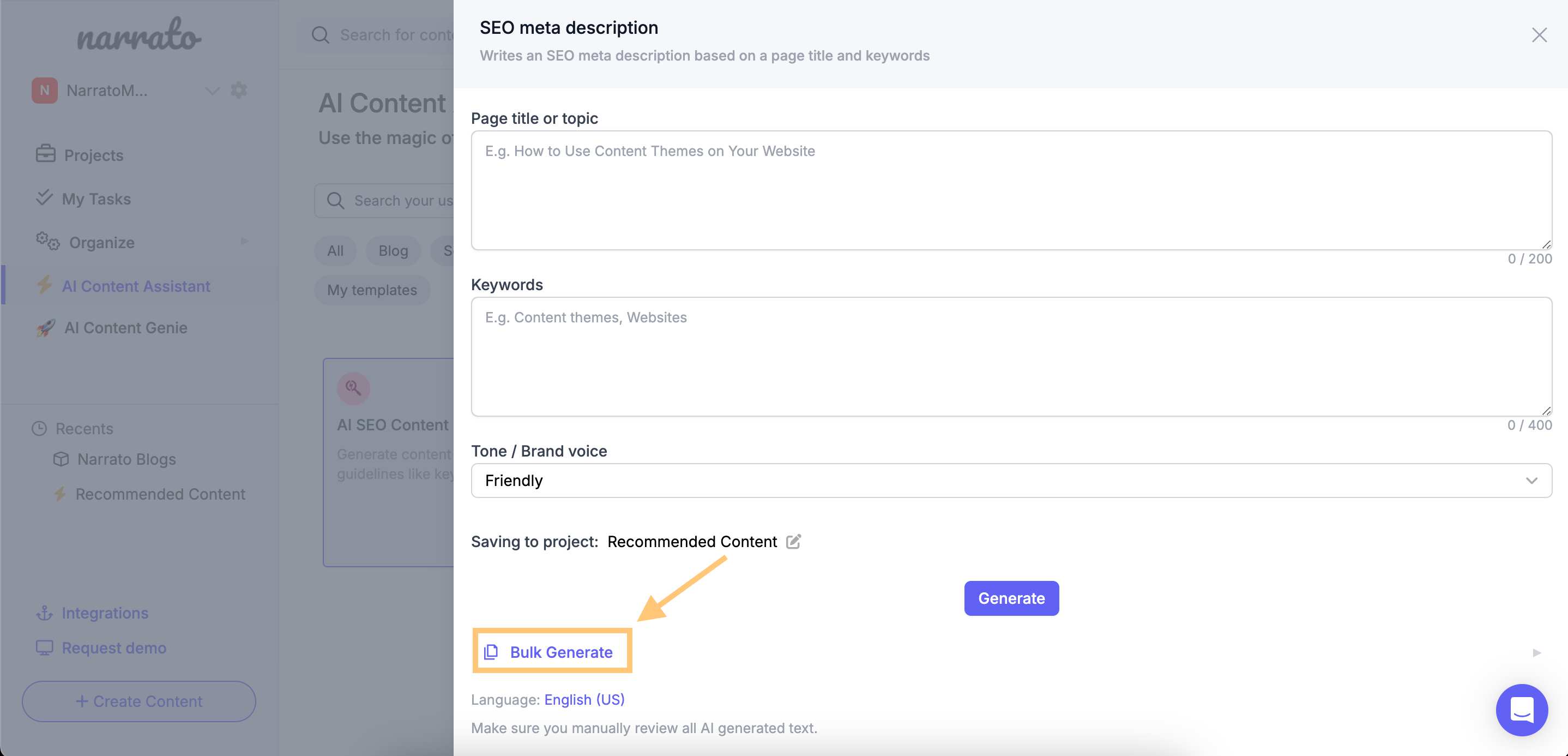
AI bulk SEO meta description and title generator
The first step in generating meta descriptions and titles in bulk is to download a sample CSV template.
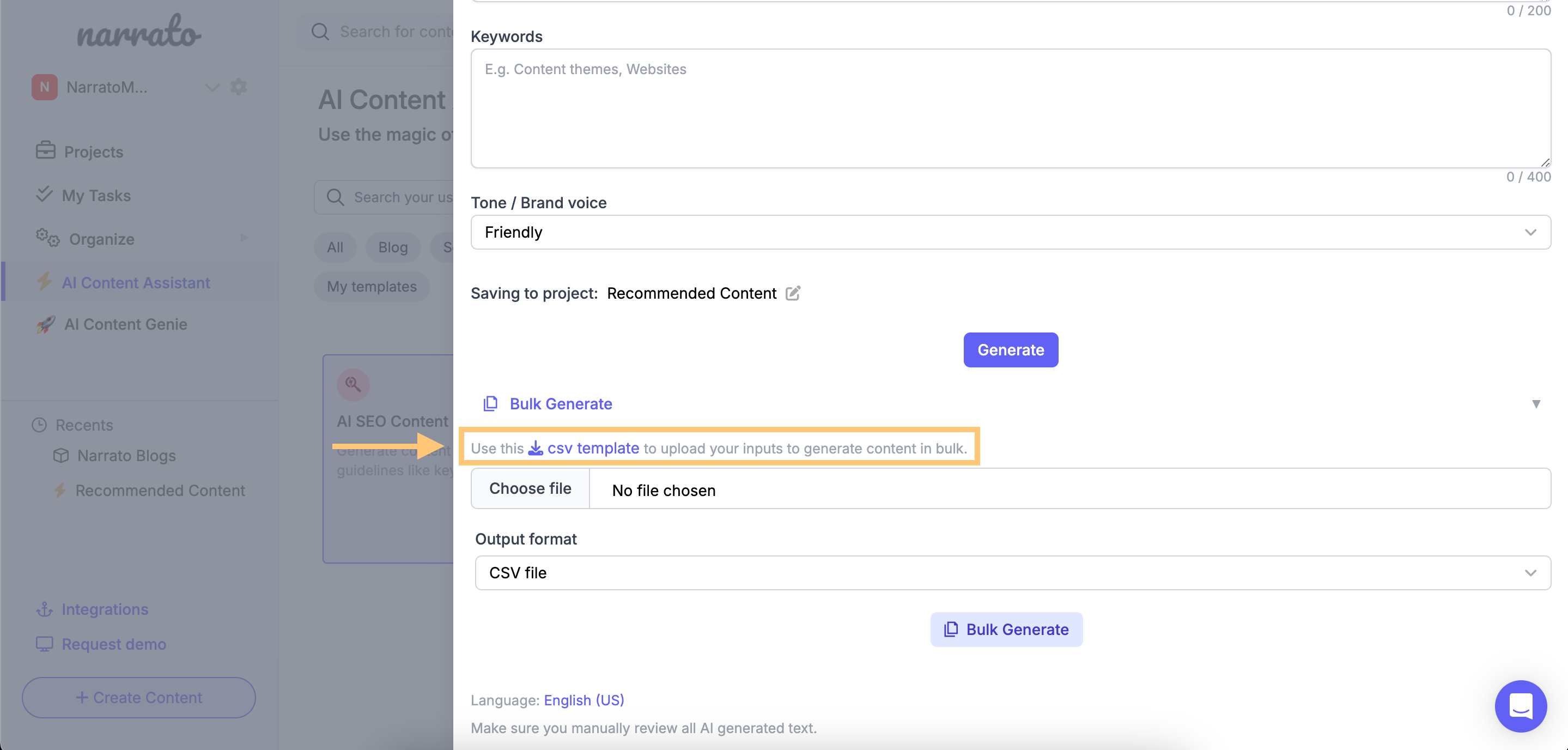
Download the CSV template for SEO meta description and title generation
This template is structured to help you input the necessary data for each page efficiently. It includes the –
- Page title/topic
- Keyword
- Tone of voice
Step 2. Upload the filled-in CSV file
Once you have filled out the CSV template with all the relevant data, the next step is to upload this file.
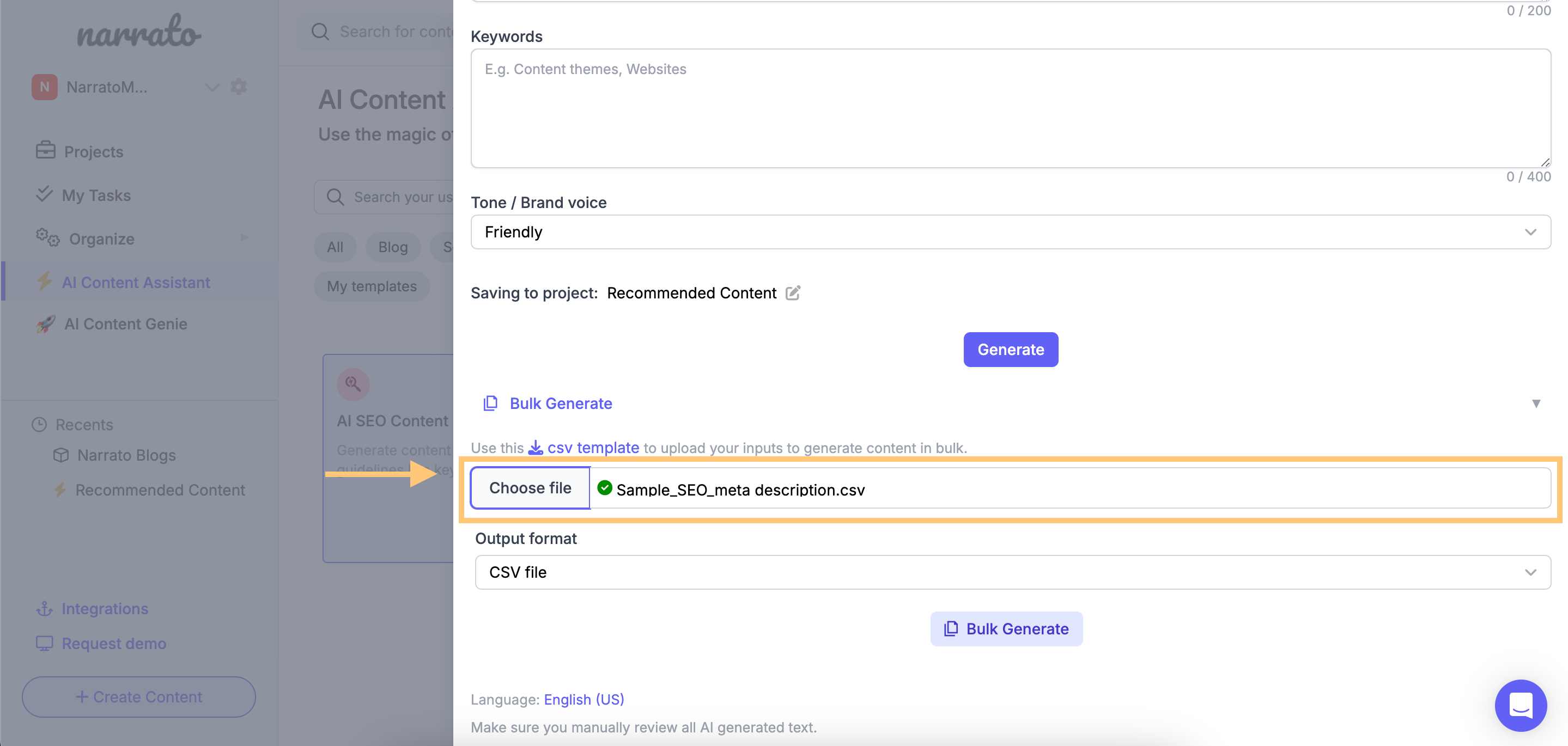
Uploading the CSV file with relevant input
Step 3. Choose the output format
After uploading the CSV, you’re given options for how you wish to download the generated meta descriptions and titles. You can get the results either as an updated CSV file or as individual content items organized in a digital folder. This flexibility allows you to choose the format that best suits your workflow and needs.
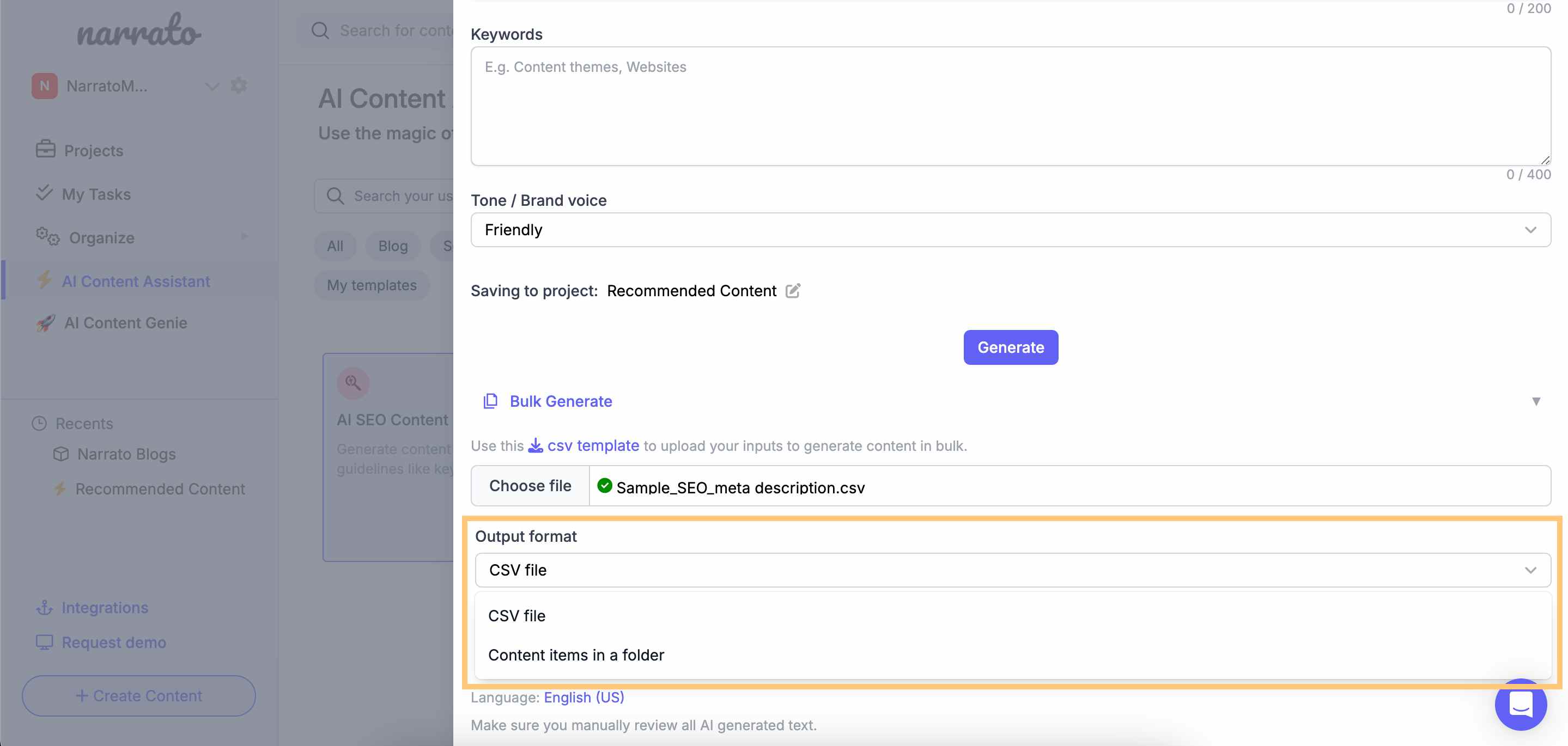
Choosing the output format for the SEO meta description and title
Step 4. Click ‘Bulk Generate’ to download AI-generated SEO meta description and title
The final step is simply to click the ‘Bulk Generate’ button. The AI tool then processes the data from the CSV file and generates unique, optimized meta descriptions and titles for each URL listed.
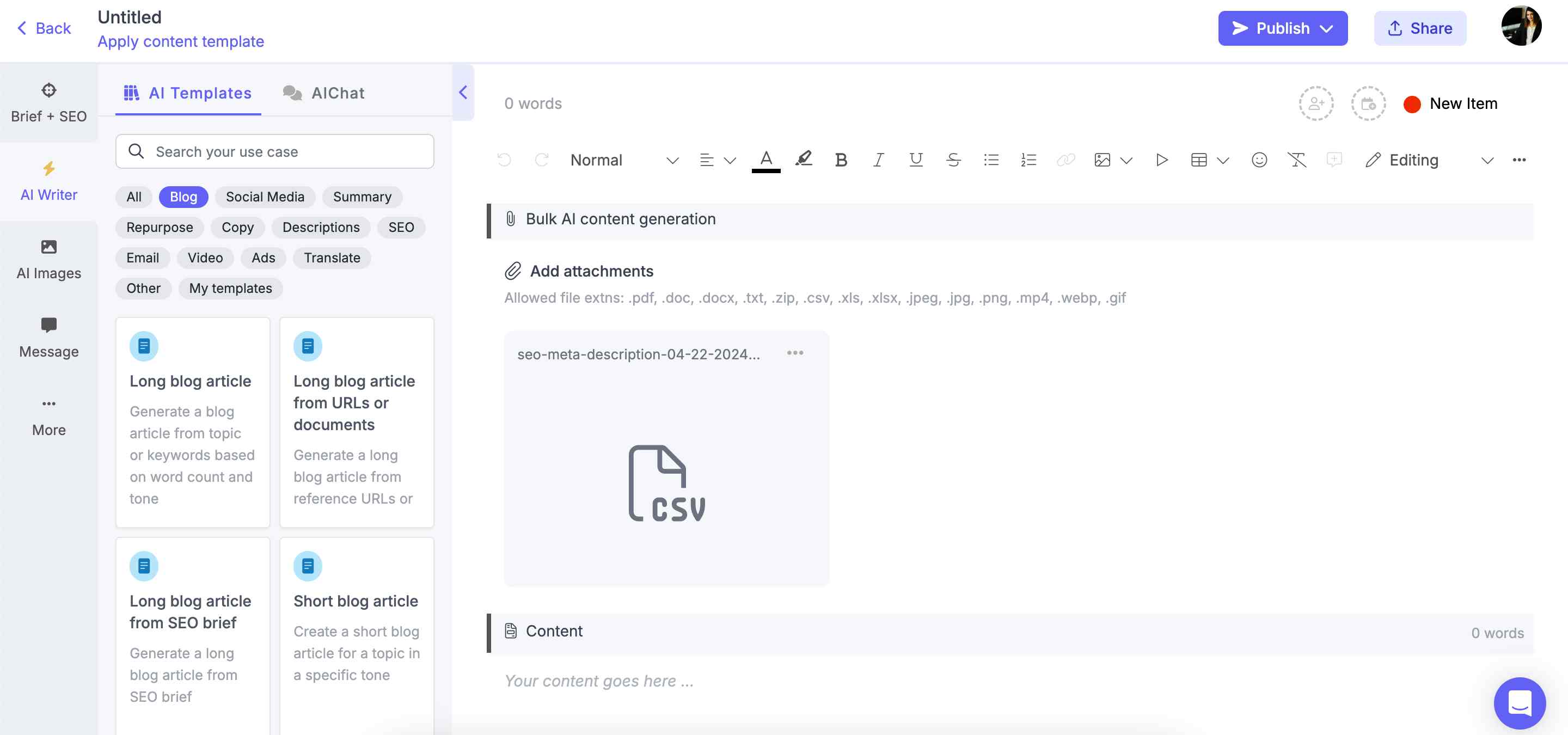
AI-generated SEO meta descriptions and titles in bulk
Once completed, you can download the results and apply them to your website, thereby enhancing your SEO efforts efficiently and effectively.
Tips for optimizing AI-generated SEO meta descriptions and titles
While AI can significantly speed up the process of generating meta descriptions and titles, optimizing these elements to ensure they perform well in search results requires a bit of human touch. Here are some tips to keep in mind –
1. Make sure they are the right length
SEO best practices suggest that meta descriptions should be between 150-160 characters and titles should not exceed 60 characters. Ensure that the AI tool you use adheres to these guidelines, as descriptions and titles within these limits are more likely to display correctly in search engine results pages (SERPs).
2. Give top priority to readability
While including keywords is important, readability should never be compromised. Make sure the AI-generated SEO meta description and title are reader-friendly. They should effectively communicate the page’s content and entice users to click through, not just cater to search engine algorithms.
3. Use a SERP preview tool to see how they would look
Before finalizing your meta titles and descriptions, use a SERP preview tool like Portent’s SERP Snippet Preview to see how they might appear in Google’s search results. This step can help you gauge if the texts are too long, too short, or just right, ensuring they are visually appealing and impactful.
4. Test and iterate
Once you add your AI-generated meta descriptions and titles to different pages, monitor their performance. Use analytics to track metrics like click-through rates and adjust as needed. Testing different variations can lead to improved SEO performance over time.
Create the perfect SEO meta tags using AI
After diving into the world of AI SEO meta description and title generator, it’s clear that this technology offers a blend of efficiency and effectiveness, ideal for anyone looking to improve their website’s search engine visibility. By leveraging AI tools, you can create compelling, concise, and highly targeted meta descriptions that not only attract the right audience but also boost your SEO efforts. Embracing AI for SEO tasks like these is stepping into the future of digital marketing.




